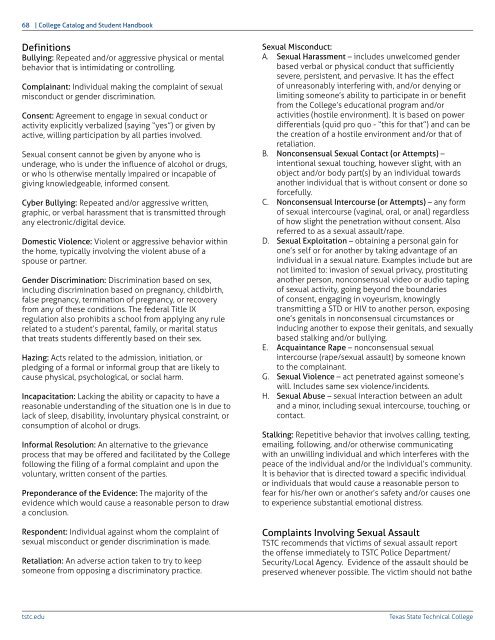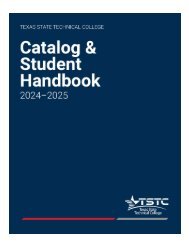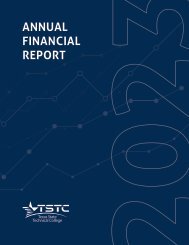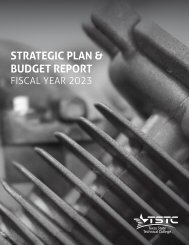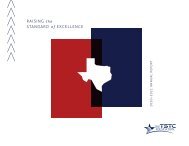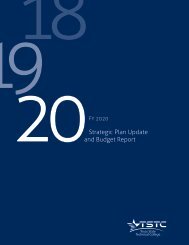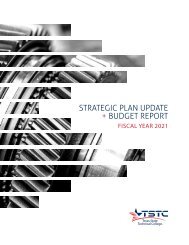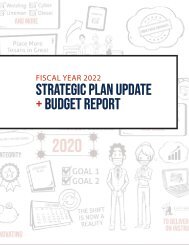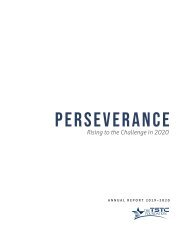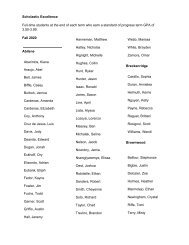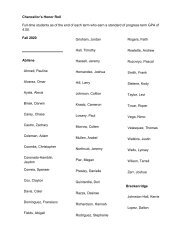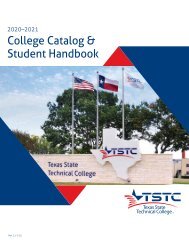Student Handbook and Catalog 2021-22 V2
You also want an ePaper? Increase the reach of your titles
YUMPU automatically turns print PDFs into web optimized ePapers that Google loves.
68 | College <strong>Catalog</strong> <strong>and</strong> <strong>Student</strong> <strong>H<strong>and</strong>book</strong><br />
Definitions<br />
Bullying: Repeated <strong>and</strong>/or aggressive physical or mental<br />
behavior that is intimidating or controlling.<br />
Complainant: Individual making the complaint of sexual<br />
misconduct or gender discrimination.<br />
Consent: Agreement to engage in sexual conduct or<br />
activity explicitly verbalized (saying “yes”) or given by<br />
active, willing participation by all parties involved.<br />
Sexual consent cannot be given by anyone who is<br />
underage, who is under the influence of alcohol or drugs,<br />
or who is otherwise mentally impaired or incapable of<br />
giving knowledgeable, informed consent.<br />
Cyber Bullying: Repeated <strong>and</strong>/or aggressive written,<br />
graphic, or verbal harassment that is transmitted through<br />
any electronic/digital device.<br />
Domestic Violence: Violent or aggressive behavior within<br />
the home, typically involving the violent abuse of a<br />
spouse or partner.<br />
Gender Discrimination: Discrimination based on sex,<br />
including discrimination based on pregnancy, childbirth,<br />
false pregnancy, termination of pregnancy, or recovery<br />
from any of these conditions. The federal Title IX<br />
regulation also prohibits a school from applying any rule<br />
related to a student’s parental, family, or marital status<br />
that treats students differently based on their sex.<br />
Hazing: Acts related to the admission, initiation, or<br />
pledging of a formal or informal group that are likely to<br />
cause physical, psychological, or social harm.<br />
Incapacitation: Lacking the ability or capacity to have a<br />
reasonable underst<strong>and</strong>ing of the situation one is in due to<br />
lack of sleep, disability, involuntary physical constraint, or<br />
consumption of alcohol or drugs.<br />
Informal Resolution: An alternative to the grievance<br />
process that may be offered <strong>and</strong> facilitated by the College<br />
following the filing of a formal complaint <strong>and</strong> upon the<br />
voluntary, written consent of the parties.<br />
Preponderance of the Evidence: The majority of the<br />
evidence which would cause a reasonable person to draw<br />
a conclusion.<br />
Respondent: Individual against whom the complaint of<br />
sexual misconduct or gender discrimination is made.<br />
Retaliation: An adverse action taken to try to keep<br />
someone from opposing a discriminatory practice.<br />
Sexual Misconduct:<br />
A. Sexual Harassment – includes unwelcomed gender<br />
based verbal or physical conduct that sufficiently<br />
severe, persistent, <strong>and</strong> pervasive. It has the effect<br />
of unreasonably interfering with, <strong>and</strong>/or denying or<br />
limiting someone’s ability to participate in or benefit<br />
from the College’s educational program <strong>and</strong>/or<br />
activities (hostile environment). It is based on power<br />
differentials (quid pro quo - “this for that”) <strong>and</strong> can be<br />
the creation of a hostile environment <strong>and</strong>/or that of<br />
retaliation.<br />
B. Nonconsensual Sexual Contact (or Attempts) –<br />
intentional sexual touching, however slight, with an<br />
object <strong>and</strong>/or body part(s) by an individual towards<br />
another individual that is without consent or done so<br />
forcefully.<br />
C. Nonconsensual Intercourse (or Attempts) – any form<br />
of sexual intercourse (vaginal, oral, or anal) regardless<br />
of how slight the penetration without consent. Also<br />
referred to as a sexual assault/rape.<br />
D. Sexual Exploitation – obtaining a personal gain for<br />
one’s self or for another by taking advantage of an<br />
individual in a sexual nature. Examples include but are<br />
not limited to: invasion of sexual privacy, prostituting<br />
another person, nonconsensual video or audio taping<br />
of sexual activity, going beyond the boundaries<br />
of consent, engaging in voyeurism, knowingly<br />
transmitting a STD or HIV to another person, exposing<br />
one’s genitals in nonconsensual circumstances or<br />
inducing another to expose their genitals, <strong>and</strong> sexually<br />
based stalking <strong>and</strong>/or bullying.<br />
E. Acquaintance Rape – nonconsensual sexual<br />
intercourse (rape/sexual assault) by someone known<br />
to the complainant.<br />
G. Sexual Violence – act penetrated against someone’s<br />
will. Includes same sex violence/incidents.<br />
H. Sexual Abuse – sexual interaction between an adult<br />
<strong>and</strong> a minor, including sexual intercourse, touching, or<br />
contact.<br />
Stalking: Repetitive behavior that involves calling, texting,<br />
emailing, following, <strong>and</strong>/or otherwise communicating<br />
with an unwilling individual <strong>and</strong> which interferes with the<br />
peace of the individual <strong>and</strong>/or the individual’s community.<br />
It is behavior that is directed toward a specific individual<br />
or individuals that would cause a reasonable person to<br />
fear for his/her own or another’s safety <strong>and</strong>/or causes one<br />
to experience substantial emotional distress.<br />
Complaints Involving Sexual Assault<br />
TSTC recommends that victims of sexual assault report<br />
the offense immediately to TSTC Police Department/<br />
Security/Local Agency. Evidence of the assault should be<br />
preserved whenever possible. The victim should not bathe<br />
tstc.edu<br />
Texas State Technical College


